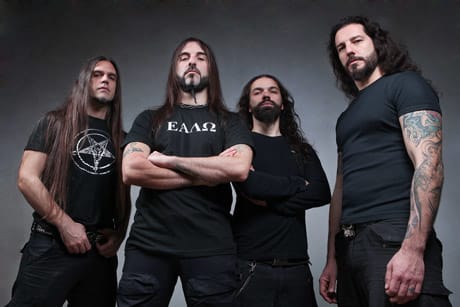It's no secret that black metal veterans Rotting Christ incorporate their Mediterranean culture into their music. But for their latest release Aealo, which came out earlier this week on Season of Mist, the Greek band have taken their Hellenic theme to the next level. In an interview with Exclaim! front-man Sakis Tolis explains the inspirational recording of Aealo and letting their cultural roots shine through their music.
"We moved to the glorious Mount Olympus - the mountain of Gods - in order to get the inspiration we were really seeking for the recording [of Aealo]," Tolis says. "This is where the studio Lunatech was located and spending almost four months there and having a continuant spiritual touch, I think that we expressed our feelings as we really wished."
In the more than 20 years that Rotting Christ have been making music, they've always been a band that, despite being primarily black metal, even fans of other metal sub-genres enjoy. Tolis attributes this ability to cross those boundaries to their Greek upbringing.
"We were always seeking new directions [in music], keeping of course our roots," he explains. "But I think that our mentality, our Mediterranean mentality, led us to [crossing the black metal barrier] because Scandinavian people have much different personalities. I think that we provided, and still provide, an alternative way of how black metal could also sound."
Especially on Aealo, the band's tenth full-length and follow-up to 2007's highly revered Theogonia, there is a very distinct native Greek vibe. Tolis says that showcasing Rotting Christ's cultural roots in their music comes naturally.
"The more I grow, the more I return back to where I was born. I am more fascinated with the ancient Hellenic culture even if I consider myself as a citizen of planet Earth, and [on Aealo] I am more into my native cultural roots," he says.
Taking their cultural concept for the album a step even further, Rotting Christ enlisted the traditional Greek choir Pliades, who are featured on most of the tracks on Aealo. The female choir from Ipiros, on Greece's mainland, sing songs typically meant for funerals.
"We wanted to catch this primitive feeling. These ladies are specialized in singing lament songs based on the ancient Greek tradition and it definitely was a better choice for us rather than the usual digital keyboards. They add an additional dark atmosphere on the whole album and they definitely sound unique."
Another Greek aspect incorporated in the album is the title. "Aealo" is the transcription of an ancient Greek word into the Latin alphabet, meaning catastrophe or destruction. Tolis says that this reflects the musical and lyrical concept of the album.
"[Aealo] is how you feel when listening an album that has to do with the feelings of a warrior during a battle; weird, strange, anger, fear, grief and so many other variations of feelings that a warrior can have during a battle," he conveys. "Listening to the album you will feel that you are in the middle of a battlefield and you are fighting against your feelings!"
"We moved to the glorious Mount Olympus - the mountain of Gods - in order to get the inspiration we were really seeking for the recording [of Aealo]," Tolis says. "This is where the studio Lunatech was located and spending almost four months there and having a continuant spiritual touch, I think that we expressed our feelings as we really wished."
In the more than 20 years that Rotting Christ have been making music, they've always been a band that, despite being primarily black metal, even fans of other metal sub-genres enjoy. Tolis attributes this ability to cross those boundaries to their Greek upbringing.
"We were always seeking new directions [in music], keeping of course our roots," he explains. "But I think that our mentality, our Mediterranean mentality, led us to [crossing the black metal barrier] because Scandinavian people have much different personalities. I think that we provided, and still provide, an alternative way of how black metal could also sound."
Especially on Aealo, the band's tenth full-length and follow-up to 2007's highly revered Theogonia, there is a very distinct native Greek vibe. Tolis says that showcasing Rotting Christ's cultural roots in their music comes naturally.
"The more I grow, the more I return back to where I was born. I am more fascinated with the ancient Hellenic culture even if I consider myself as a citizen of planet Earth, and [on Aealo] I am more into my native cultural roots," he says.
Taking their cultural concept for the album a step even further, Rotting Christ enlisted the traditional Greek choir Pliades, who are featured on most of the tracks on Aealo. The female choir from Ipiros, on Greece's mainland, sing songs typically meant for funerals.
"We wanted to catch this primitive feeling. These ladies are specialized in singing lament songs based on the ancient Greek tradition and it definitely was a better choice for us rather than the usual digital keyboards. They add an additional dark atmosphere on the whole album and they definitely sound unique."
Another Greek aspect incorporated in the album is the title. "Aealo" is the transcription of an ancient Greek word into the Latin alphabet, meaning catastrophe or destruction. Tolis says that this reflects the musical and lyrical concept of the album.
"[Aealo] is how you feel when listening an album that has to do with the feelings of a warrior during a battle; weird, strange, anger, fear, grief and so many other variations of feelings that a warrior can have during a battle," he conveys. "Listening to the album you will feel that you are in the middle of a battlefield and you are fighting against your feelings!"




